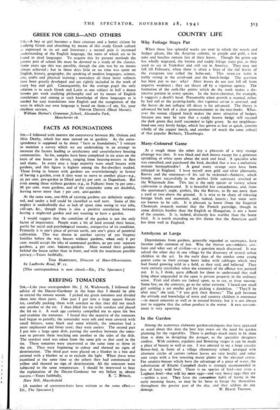FACTS AS FOUNDATIONS
followed with interest the controversy between Mr. Osborn and Miss Denby, which has now moved- on to gardens. As the corre- spondence is supposed to be about " facts as foundations," I venture to mention a survey which we are undertaking in an attempt to measure the factors leading to satisfactory and unsatisfactory housing communities. So far, samples have been completed in six areas on the . basis of one house in eleven, ranging from housing-estates to flats and slums. In every area a large majority want small houses with gardens, and this figure is highest among the - flat-dwellers studied. Those living in houses with gardens are overwhelmingly in favour of having a garden, even it they want to move to another place—e.g., 95 per cent. pro-garden in Ilford and 93 per cent. m Dagenham. But even among those without gardens (e.g., in Fulham) from 79 per cent.- 88 per cent. want gardens, and of the remainder some are doubtful, leaving never more than -7 per cent. anti-garden.
At the same time, one-fifth of existing gardens are definitely neglec- ted, and under a half could be classified as well kept: Some of this neglect is undoubtedly die to lack of spare time owing to war jobs, call-ups, &c., though there is also a positive correlation between having- a neglected garden and not wanting to have a garden.
I would suggest that the condition of the garden is not the only factor of importance. People want a bit of land around their house, partly for social and psychological reasons, irrespective of its condition. Primarily it is one's piece of private earth, not one's piece of potential cultivation. This was shown in another survey of 30o Stepney families before the war, houses- without gardens, when only 6 per cent. would accept the idea of communal gardens, 90 per cent. separate gardens, 4 per cent. balcony-gardens. Most wanted their gardens behind the house rather than in front, and with the maximum possible privacy.—Yours faithfully, [This correspondence is now closed.—En., The Spectator.]


























 Previous page
Previous page